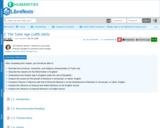
Brief history of the Tudor Age
- Subject:
- Language, Philosophy, and Culture
- Literature
- Material Type:
- Reading
- Author:
- Laura Getty
- Bonnie J. Robinson
- Date Added:
- 02/23/2022

Brief history of the Tudor Age

Activity for HIST 1301 United States History I (Introduction)
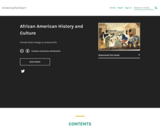
This textbook covers a variety of topics related to African American History and culture, from African Origins to the Reconstruction era.
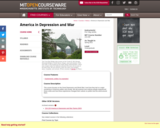
This course focuses on the Great Depression and World War II and how they led to a major reordering of American politics and society. We will examine how ordinary people experienced these crises and how those experiences changed their outlook on politics and the world around them.
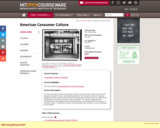
This class examines how and why twentieth-century Americans came to define the ŰĎgood lifeŰ through consumption, leisure, and material abundance. We will explore how such things as department stores, nationally advertised brand-name goods, mass-produced cars, and suburbs transformed the American economy, society, and politics. The course is organized both thematically and chronologically. Each period deals with a new development in the history of consumer culture. Throughout we explore both celebrations and critiques of mass consumption and abundance.
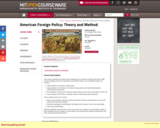
Examines the causes and consequences of American foreign policy since 1898. Readings cover theories of American foreign policy, historiography of American foreign policy, central historical episodes including the two World Wars and the Cold War, case study methodology, and historical investigative methods. Open to undergraduates by permission of instructor.
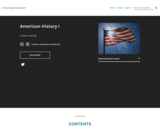
This is a collection of Coursework for an American History course.
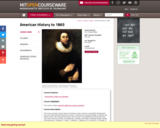
This course provides a basic history of American social, economic, and political development from the colonial period through the Civil War. It examines the colonial heritages of Spanish and British America; the American Revolution and its impact; the establishment and growth of the new nation; and the Civil War, its background, character, and impact. Readings include writings of the period by J. Winthrop, T. Paine, T. Jefferson, J. Madison, W. H. Garrison, G. Fitzhugh, H. B. Stowe, and A. Lincoln.
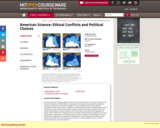
Explores the changing roles, ethical conflicts, and public perceptions of science and scientists in American society from World War II to the present. Studies specific historical episodes focusing on debates between scientists and the contextual factors influencing their opinions and decisions. Topics include the atomic bomb project, environmental controversies, the Challenger disaster, biomedical research, genetic engineering, (mis)use of human subjects, scientific misconduct and whistleblowing.
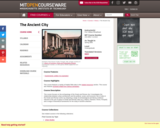
This course focuses on the archaeology of the Greek and Roman city. It investigates the relationship between urban architecture and the political, social, and economic role of cities in the Greek and Roman world. Analyzes a range of archaeological and literary evidence relevant to the use of space in Greek and Roman cities (e.g. Athens, Paestum, Rome, Pompeii) and a range of theoretical frameworks for the study of ancient urbanism.
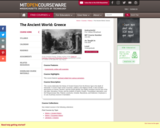
History of Ancient Greece from the Bronze Age to the death of Alexander. Major social, economic, political, and religious trends. Homer, heroism, and the Greek identity; the hoplite revolution and the rise of the city-state; Herodotus, Persia, and the (re)birth of history; Empire, Thucydidean rationalism, and the Peloponnesian War; Platonic constructs; Aristotle, Macedonia, and Hellenism. Emphasis on use of primary sources in translation.
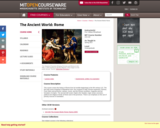
This course covers the history of Rome from its humble beginnings to the 5th century A.D. The first half covers Kingship to Republican form; the conquest of Italy; Roman expansion: Pyrrhus, Punic Wars and provinces; classes, courts, and the Roman revolution; Augustus and the formation of empire. The second half covers Virgil to the Vandals; major social, economic, political and religious trends at Rome and in the provinces. There is an emphasis on the use of primary sources in translation.
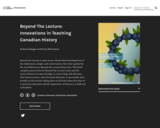
Beyond the Lecture is open access ebook which developed out of the enthusiasm, insight, and conversations that were sparked by the ActiveHistory.ca Beyond the Lecture blog series. This book compiles pieces from the Beyond the Lecture series and the Active History site more broadly, as well as blogs like Borealia, The Otter/La loutre, and Unwritten Histories. It also builds more broadly on discussions taking place at all levels about the value of a university education and the importance of history as a field and a discipline.
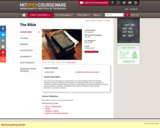
An introduction to major Biblical texts including Genesis, Exodus, Job, the prophetic and historic books of the Old Testament, and the Gospels and Epistles. Stresses the place of the Bible as foundation text for central religious, ethical, and political thinking. Comparative readings in related traditions, ancient, Near Eastern, and Middle Eastern. Investigation of the Bible as influence in later narrative, philosophic, and artistic traditions.
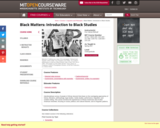
Interdisciplinary survey of people of African descent that draws on the overlapping approaches of history, literature, anthropology, legal studies, media studies, performance, linguistics, and creative writing. This course connects the experiences of African-Americans and of other American minorities, focusing on social, political, and cultural histories, and on linguistic patterns.
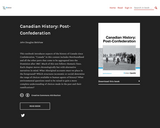
This textbook introduces aspects of the history of Canada since Confederation. “Canada” in this context includes Newfoundland and all the other parts that come to be aggregated into the Dominion after 1867. Much of this text follows thematic lines. Each chapter moves chronologically but with alternative narratives in mind. What Aboriginal accounts must we place in the foreground? Which structures (economic or social) determine the range of choices available to human agents of history? What environmental questions need to be raised to gain a more complete understanding of choices made in the past and their ramifications? Each chapter is comprised of several sections and some of those are further divided. In many instances you will encounter original material that has been contributed by other university historians from across Canada who are leaders in their respective fields. They provide a diversity of voices on the subject of the nation’s history and, thus, an opportunity to experience some of the complexities of understanding and approaching the past. Canadian History: Post-Confederation includes Learning Objectives and Key Points in most chapter sections, intended to help identify issues of over-arching importance. Recent interviews with historians from across Canada have been captured in video clips that are embedded throughout the web version of the book. At the end of each chapter, the Summary section includes additional features: Key Terms, Short Answer Exercises, and Suggested Readings. The key terms are bolded in the text, and collected in a Glossary in the appendix.
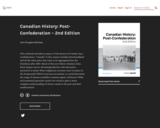
This textbook introduces aspects of the history of Canada since Confederation. “Canada” in this context includes Newfoundland and all the other parts that come to be aggregated into the Dominion after 1867. Much of this text follows thematic lines. Each chapter moves chronologically but with alternative narratives in mind. What Indigenous accounts must we place in the foreground? Which structures (economic or social) determine the range of choices available to human agents of history? What environmental questions need to be raised to gain a more complete understanding of choices made in the past and their ramifications?
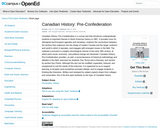
Canadian History: Pre-Confederation is a survey text that introduces undergraduate students to important themes in North American history to 1867. It provides room for Aboriginal and European agendas and narratives, explores the connections between the territory that coalesces into the shape of modern Canada and the larger continent and world in which it operates, and engages with emergent issues in the field. The material is pursued in a largely chronological manner to the early 19th century, at which point social, economic, and political change are dissected. Canadian History: Pre-Confederation provides, as well, a reconnaissance of historical methodology and debates in the field, exercises for students, Key Terms and a Glossary, and section-by-section Key Points. Although this text can be modified, expanded, reduced, and reorganized to suit the needs of the instructor, it is organized so as to support learning, to broaden (and sometimes provoke) debate, and to engage students in thinking like historians. Written and reviewed by subject experts drawn from colleges and universities, this is the first open textbook on the topic of Canadian history.
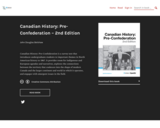
Canadian History: Pre-Confederation is a survey text that introduces undergraduate students to important themes in North American history to 1867. It provides room for Indigenous and European agendas and narratives, explores the connections between the territory that coalesces into the shape of modern Canada and the larger continent and world in which it operates, and engages with emergent issues in the field.
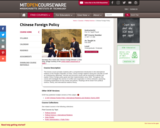
This lecture course provides students with a comprehensive introduction to the international relations of the People's Republic of China. China's foreign relations during the Cold War as well as contemporary diplomatic, security and economic issues will be examined to identify and explain China's foreign policy goals and their implementation since 1949. Throughout, this course will investigate the sources of conflict and cooperation in China's behavior, assessing competing explanations for key events and policies. Readings will be drawn from political science, history, and international relations theory.